| Listing 1 - 10 of 13 | << page >> |
Sort by
|
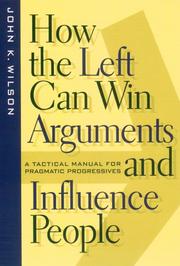
ISBN: 0814784585 0814793622 0814793630 Year: 2001 Publisher: New York, N.Y. : New York University Press,
Abstract | Keywords | Export | Availability | Bookmark
 Loading...
Loading...Choose an application
- Reference Manager
- EndNote
- RefWorks (Direct export to RefWorks)
If we were to rely on what the pundits and politicians tell us, we would have to conclude that America is a deeply conservative nation. Americans, we hear constantly, detest government, demand lower taxes and the end of welfare, and favor the death penalty, prayer in school, and an absolute faith in the free market. And yet Americans believe deeply in progressive ideas. In fact, progressivism has long been a powerful force in the American psyche. Consider that a mere generation ago the struggle for environmentally sound policies, for women's rights, and for racial equality were fringe movement
Book
ISBN: 1282300458 9786612300455 1609944615 Year: 2009 Publisher: San Francisco : Berrett-Koehler Publishers,
Abstract | Keywords | Export | Availability | Bookmark
 Loading...
Loading...Choose an application
- Reference Manager
- EndNote
- RefWorks (Direct export to RefWorks)
Times are changing. Instead of obsessing about what they're against, progressives have begun to think about what they're for-to prepare once again to play their role as agents of bold ideas and political and social transformation. Finding new confidence and imagination, they have begun to renew their political capital. The essays in this volume draw on that new store of capital to sketch the outlines of a progressive agenda for 21st-century America.Authors such as Van Jones, Dean Baker, Andrea Batista Schlesinger and Miles Rapoport cover a wide array of topics and, in their policy recommendation
Progressivism (United States politics) --- United States --- Politics and government.
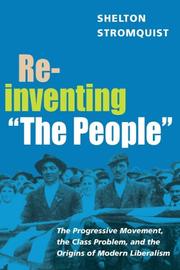
ISBN: 1283044102 9786613044105 0252092619 0252030265 0252072693 9780252092619 9780252030260 9780252072697 9781283044103 6613044105 Year: 2006 Publisher: Urbana
Abstract | Keywords | Export | Availability | Bookmark
 Loading...
Loading...Choose an application
- Reference Manager
- EndNote
- RefWorks (Direct export to RefWorks)
Working class --- Social reformers --- Social classes --- Progressivism (United States politics) --- Political activity
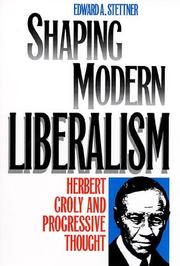
ISBN: 0700605800 0700631224 0700631712 Year: 1993 Publisher: University Press of Kansas
Abstract | Keywords | Export | Availability | Bookmark
 Loading...
Loading...Choose an application
- Reference Manager
- EndNote
- RefWorks (Direct export to RefWorks)
American ideals—liberty, equality, democracy, national unity—are bandied about by liberal politicians as a package deal, inseparably intertwined. But the words often flow together better as rhetoric than they mold together in theory. But, as Herbert Croly and his turnofthecentury contemporaries found, jelling these appealing yet often conflicting concepts into a liberal philosophy was not nearly as easy as embracing them in a campaign speech. In this first fulllength study of Herbert Croly's political theory, Edward Stettner analyzes Croly's writings and examines the events, experiences, and people who influenced Croly's thinking. In the process, he reveals Croly's significant influence on modern liberalism as classical liberal theory merged with progressive philosophy. Croly, founder of The New Republic, expounded on issues from the nationalization of railroads to the Espionage Act in his search for a middle way between socialism and capitalism. Stettner illustrates how Croly's political theory influenced the editorial position of one of the leading liberal journals and how his thought in turn was modified in reaction to national and world events, such as presidential elections and World War I. Stettner portrays Croly as a modest and conscientious intellectual who wholeheartedly came to embrace the progressive movement and consequently helped establish the framework for modern liberalism. In doing so, Stettner emphasizes how Croly's philosophy evolved and how Croly was drawn to the conclusion that a strong national government and individual rights could indeed coexist—if not always serenely—in a democratic society.
Progressivism (United States politics) --- Liberalism --- History. --- Croly, Herbert David, --- Political science & theory
Book
ISBN: 145719662X 1607324334 9781607324331 9781457196621 9781607324324 1607324326 Year: 2016 Publisher: Boulder
Abstract | Keywords | Export | Availability | Bookmark
 Loading...
Loading...Choose an application
- Reference Manager
- EndNote
- RefWorks (Direct export to RefWorks)
"Persistent Progressives tells the story of the Rocky Mountain Farmers Union's evolution from an early movement against monopolists and wholesalers to a regional trailblazer for agriculture ideologies built on social democracy, the family farmer, and cooperative enterprises. As a continuing advocate for saving the family farm, the Farmers Union legacy provides a unique window into the transformation of the agriculture and rural communities in Wyoming, Colorado, and New Mexico. Using data spanning decades, author John Freeman covers the founding of the RMFU in 1907 until the present, demonstrating how members continually sought to control the means of production and marketing by forming cooperatives, providing consumer services, and engaging in politics. Powering this evolution was a group of 'practical idealists'--the Farmers Union leaders and titular persistent progressives who shaped the organization's growth and expansion. Initiated by Jim Patton, who brought the organization out of its oppositional roots and into its cooperative advocacy, the RMFU passed to John Stencel and then David Carter, joining hands with agricultural conservationists and small organic producers along the way to carry the torch for progressive agrarianism in today's urbanized world. Shaken but undeterred by some notable failures, its leadership remains convinced of the efficacy of cooperatives as a means to achieve justice for all. Discussing the broader social, economic, political, and environmental issues related to farming, ranching, and urbanization, Persistent Progressives seamlessly blends regional history with ongoing issues of agricultural and economic development"--
Progressivism (United States politics) --- Agriculture and politics --- Farmers --- Family farms --- Agriculture, Cooperative --- History. --- Political activity --- Economic conditions. --- Rocky Mountain Farmers Union
Book
ISBN: 9798890871572 0807860727 Year: 2001 Publisher: Chapel Hill : University of North Carolina Press,
Abstract | Keywords | Export | Availability | Bookmark
 Loading...
Loading...Choose an application
- Reference Manager
- EndNote
- RefWorks (Direct export to RefWorks)
From 1915 to 1920, Progressive reformers led a spirited but unsuccessful crusade for compulsory health insurance in New York State. Beatrix Hoffman shows that this first health insurance campaign was a crucial moment in the creation of the American welfare state and health care system.
Health insurance. --- Insurance, Health. --- Progressivism (United States politics). --- Business. --- Social Science. --- Health insurance --- Progressivism (United States politics) --- Politics --- Insurance, Health --- Social Conditions --- History, 20th Century --- Socioeconomic Factors --- History, Modern 1601 --- -Sociology --- Insurance --- Social Sciences --- Population Characteristics --- Financing, Organized --- History --- Economics --- Humanities --- Health Care --- Health Care Economics and Organizations
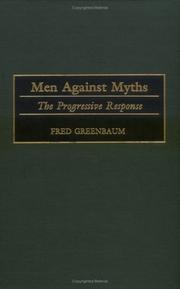
ISBN: 027596888X 0313003009 9780313003004 9798400684722 Year: 2000 Publisher: Westport, Conn. Praeger
Abstract | Keywords | Export | Availability | Bookmark
 Loading...
Loading...Choose an application
- Reference Manager
- EndNote
- RefWorks (Direct export to RefWorks)
BUSINESS & ECONOMICS --- Economics / General --- Progressivism (United States politics) --- Politicians --- Capitalism --- United States - General --- Regions & Countries - Americas --- History & Archaeology --- History --- Market economy --- United States --- Politics and government --- Economics --- Profit --- Capital
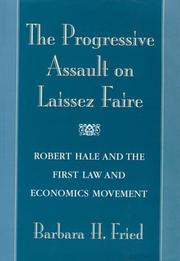
ISBN: 0674775279 0674006984 0674037308 9780674037304 9780674006980 Year: 2001 Publisher: Cambridge: Harvard university press,
Abstract | Keywords | Export | Availability | Bookmark
 Loading...
Loading...Choose an application
- Reference Manager
- EndNote
- RefWorks (Direct export to RefWorks)
Law and economics is the leading intellectual movement in law today. This book examines the first great law and economics movement in the early part of the twentieth century through the work of one of its most original thinkers, Robert Hale. Beginning in the 1890s and continuing through the 1930s, progressive academics in law and economics mounted parallel assaults on free-market economic principles. They showed first that "private," unregulated economic relations were in fact determined by a state-imposed regime of property and contract rights. Second, they showed that the particular regime of rights that existed at that time was hard to square with any common-sense notions of social justice. Today, Hale is best known among contemporary legal academics and philosophers for his groundbreaking writings on coercion and consent in market relations. The bulk of his writing, however, consisted of a critique of natural property rights. Taken together, these writings on coercion and property rights offer one of the most profound and elaborated critiques of libertarianism, far outshining the better-known efforts of Richard Ely and John R. Commons. In his writings on public utility regulation, Hale also made important contributions to a theory of just, market-based distribution. This first, full-length study of Hale's work should be of interest to legal, economic, and intellectual historians.
Ecole néo-classique (Economie) --- Institutional economics --- Institutionalisme --- Neoclassical school of economics --- Neoklassieke school (Economie) --- Nouvelle économie --- Progressisme (Amerikaanse politiek) --- Progressisme (Politique américaine) --- Progressivism (United States politics) --- Économie institutionnaliste --- Économie institutionnelle --- Critical legal studies --- Free enterprise --- Institutional economics. --- Neoclassical school of economics. --- Right of property --- Progressivism (United States politics). --- United States --- Hale, Robert Lee --- Cambridge school of economics --- Marshallian economics --- Classical school of economics --- Schools of economics --- Economics --- Economic liberties (U.S. Constitution) --- Hale, Robert L. --- Hale, Robert Lee, --- E-books
Book
ISBN: 0300180764 9786613916822 0300184689 128360437X 9780300184686 9781283604376 9780300180763 Year: 2012 Publisher: New Haven Yale University Press
Abstract | Keywords | Export | Availability | Bookmark
 Loading...
Loading...Choose an application
- Reference Manager
- EndNote
- RefWorks (Direct export to RefWorks)
"In this third volume of his award-winning American Crisis series, James Gustave Speth makes his boldest and most ambitious contribution yet. He looks unsparingly at the sea of troubles in which the United States now finds itself, charts a course through the discouragement and despair commonly felt today, and envisions what he calls America the Possible, an attractive and plausible future that we can still realize.The book identifies a dozen features of the American political economy--the country's basic operating system--where transformative change is essential. It spells out the specific changes that are needed to move toward a new political economy--one in which the true priority is to sustain people and planet. Supported by a compelling "theory of change" that explains how system change can come to America, the book also presents a vision of political, social, and economic life in a renewed America. Speth envisions a future that will be well worth fighting for. In short, this is a book about the American future and the strong possibility that we yet have it in ourselves to use our freedom and our democracy in powerful ways to create something fine, a reborn America, for our children and grandchildren"-- "The "New Economy Movement," as Gar Alperovitz described it in The Nation, is an effort to unite the various wings of progressive politics into a coherent set of ideas and programs that will be radically different from the current free-market paradigm. The movement arises out of environmentalism: the era of climate change, it asserts, demands a much deeper rethinking of American institutions than much of the political establishment is willing to contemplate. This book, as its title suggests, is the New Economy Movement's manifesto. Gus Speth argues that America faces four problems of such magnitude that any one of them could seriously undermine the nation. All four together will almost certainly lead to a crisis, especially since the problems interact with each other. The four problems are: 1. the growth of inequality in our country, which is not only an economic burden but a social one, as it is creating classes of people who have little knowledge of or sympathy for each others' lives, and little commitment to addressing the problems of others; 2. the increasingly onerous burden of foreign military commitments; 3. climate change; 4. our increasingly polarized and dysfunctional politics. It's the interactions that are the most frightening: how, for instance, will the U.S. respond to sea-level rise in Bangladesh that forces tens of millions of people to flee the coast for higher ground? This would not only create a humanitarian crisis but a diplomatic and military one as well. America, politically paralyzed and economically almost bankrupt, would be called upon to act or cede its strategic supremacy"--
Environmental policy --- Social justice --- Progressivism (United States politics) --- Business & Economics --- Economic History --- United States --- Economic policy. --- E-books --- POLITICAL SCIENCE / Public Policy / Economic Policy. --- POLITICAL SCIENCE / Public Policy / Environmental Policy. --- BUSINESS & ECONOMICS / Economic Conditions. --- BUSINESS & ECONOMICS / Development / Sustainable Development. --- BUSINESS & ECONOMICS / Environmental Economics.
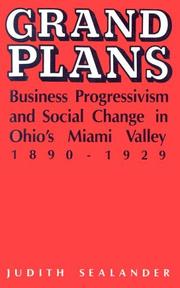
ISBN: 0813116538 1322597375 0813159490 9780813159492 Year: 2015 Publisher: Lexington The University Press of Kentucky
Abstract | Keywords | Export | Availability | Bookmark
 Loading...
Loading...Choose an application
- Reference Manager
- EndNote
- RefWorks (Direct export to RefWorks)
Scholars may have widely differing views of the Progressive Era, but all see business as holding the key to the reforms of that period. In this new book Judith Sealander amplifies our understanding of the relationship between business leaders and reform through a detailed examination of Dayton and the Miami Valley of Ohio. She focuses specifically on four progressive projects that made this nine-county region nationally known as a center for reform activism.The four ""projects"" include an extensive program of employee benefits instituted at the National Cash Register Company; the creation, in
Progressivism (United States politics) --- Business and politics --- Business --- Politics and business --- Politics, Practical --- Political business cycles --- History. --- Political aspects --- Miami River Region (Ohio) --- Dayton (Ohio) --- Economic conditions. --- Politics and government. --- History --- Miami River Region&delete& --- E-books --- City of Dayton (Ohio) --- Miami River Region
| Listing 1 - 10 of 13 | << page >> |
Sort by
|

 Search
Search Feedback
Feedback About UniCat
About UniCat  Help
Help News
News